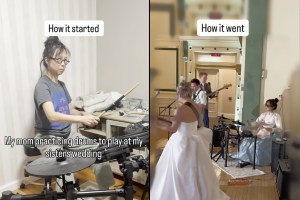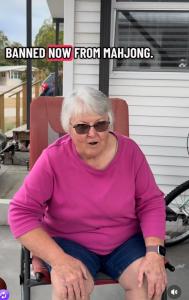Joan Each Rowan has no idea how many people her salons have helped throughout the years.
The evidence, however, quietly speaks for itself.
You can see it in the disappearing “how to get help” brochures off the counter. You’ll spot it on tab flyers that hang on a wall or bulletin board — the ones where you tear off a strip with a number to call.
“Those need to be replaced — and often,” says Rowan, who owns the two Everything’s Relative salons on Chicago’s south side.
Photo via Everything’s Relative Salon, used with permission.
For the past 20 years, Rowan has been pushing for her salon to be a place where people get help with more than just their hair. With assistance from advocates committed to ending domestic violence, she’s been teaching her stylists what to do (and what not to do) if they suspect or know a client is being abused at home. She also places resources, like the brochures, in discreet areas of her businesses, such as the bathroom, for clients to take with them if they need help.
Now, the stylists at Everything’s Relative Salons have become unlikely warriors in the fight against domestic abuse. Soon, every other stylist in Illinois will be too.
Illinois just became the first state to require that all licensed beauty professionals take an hour-long course on how to spot domestic abuse.
Starting on Jan. 1, 2017, new cosmetologists will have to take the course in order to obtain their license, as the Chicago Tribune reported. The training will also be folded into continuing education requirements stylists must complete every two years to renew their credentials.
Although Rowan wasn’t the first or only salon professional to implement her own training without a law telling her to do so, Everything’s Relative has been at the forefront of the issue for decades, having realized the important connection between the seriousness of domestic abuse and the simplicity of getting a haircut.
Domestic abuse is an issue that no doubt affects many clients who walk through the doors at Everything’s Relative — about 1 in 3 women and 1 in 7 men in the U.S. experience violence at the hands of a partner at some point in their lifetime, according to nonprofit Chicago Says No More.
The thinking behind the new law — which was brought before legislators by Chicago Says No More — is both obvious and clever.
“[Clients] tell you a lot,” says Rowan, who’s worked in the industry for 42 years. “People talk to their hairdressers.”
When clients talk, proponents of the law say, it only makes sense that cosmetologists should be prepared to listen and respond accordingly, if a red flag should arise.
The law — an amendment to the Barber, Cosmetology, Esthetics, Hair Braiding, and Nail Technology Act of 1985 — was put in motion by Illinois Rep. Fran Hurley and State Senator Bill Cunningham, who said his wife’s experience as a stylist years ago inspired him to act.
“She told me stories about her clients providing details about terrible incidents,” he explained to the New York Times. “She offered a sympathetic ear. She was young at the time and did not know how to get them help.”
The law aims to leave no stylist feeling like Cunningham’s wife had — helpless and with few resources to provide a client in need.
The training will help stylists feel empowered about speaking up — without crossing a line, according to Rowan.
First and foremost, stylists are not required to report incidents of violence and won’t be held liable in any case involving a client — an important aspect of the law meant to protect beauty professionals.
The training will, however, teach them how to spot signs of abuse and suggest resources clients can access (such as nearby safe havens or numbers to call) while making sure to carry a judgement-free and caring demeanor.
A Paul Mitchell cosmetology school in McLean, Virginia. Photo by Brendan Smialowski/AFP/Getty Images.
The course also outlines what stylists shouldn’t do — like follow-up with their client on the suspected abuse the next time they visit the salon or try to counsel clients on their specific situations.
“We are not psychologists. We’re not the cops,” Rowan says. “But the sensitivity training will give the cosmetologists the confidence to be able to say, ‘There’s information in the bathroom over there if you need a hand,’ or, ‘You really don’t need to put up with that.’”
“It’s very, very important,” Rowan says of the new law. “And I don’t think it should stop with cosmetologists.”
Similarly to how many workers are educated on sexual harassment or how to handle instances of discrimination in the workplace, it wouldn’t be such a bad idea for other positions requiring a state license to get domestic abuse training too, she notes.
While Rowan can’t guarantee everyone in the cosmetology industry will be on board with the new law — some have argued, for example, that the law puts unnecessary pressure on stylists to be crime-stoppers — she has no reason to think it won’t be widely accepted: “I have not talked to a salon owner who has thought it was a bad idea.”
“This is going to be great for everyone,” Rowan says. “We live in a violent city. But violence begins at home.”


































